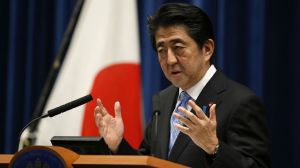The latest early election for the lower house of Japan’s parliament has ended with a crushing victory for the Liberal Democratic Party (LDP), which, together with its “junior partner” in the parliamentary coalition – New Komeito Party (NFP) – has managed to secure the majority. Out of a total of 475 seats in the lower house, LDP representatives obtained 291 (four less than before the elections), while NFP got – 35 (four more).
The Democratic Party of Japan has secured 73 seats, while the Communist Party of Japan has doubled the number of its representatives, which has reached 21. The Japan Innovation Party which was formed three months before the elections in September 2014 out of representatives of former extreme right parties has won 42 seats.
Thus, ideologically the Japan Innovation Party strictly differs from the other two non-governmental parties, therefore one cannot expect too much cooperation between the three. As for the most pressing concern of today’s Japanese policy – changes to article 9 of the Constitution, it’s likely that the JIP will provide the LDP with full support regarding this concern.
The relative success of the Communist Party has become one of the most remarkable outcomes of the elections. After becoming the third strongest opposition force in Japan, the Communist Party consistently opposes the LDP in all key political matters.
After repeating an unprecedented electoral success that it has shown two years ago, the LDP remains a dominant player in the political life of Japan. It may seem that the sitting government has reason to believe that it has received approval from Japan’s population to carry on its policies, not only in the economic sphere, but in its plans to revise the “pacifist” constitution of 1947 as well.
However, the Japanese press expressed doubts on the plausibility of such claims, if one is to take into consideration the traditionally low voter turnout, which remained below fifty percent. In addition, journalists are drawing attention to the skillful tactics of the Prime Minister and the president of the Liberal Democratic Party, Shinzo Abe in his debates with political opponents.
He tried to keep focus on government interventions in the economy, which in his opinion was the reason for early elections. At the same time Abe tried to avoid discussing of the issues which wouldn’t allow him to obtain wide support.
Among these one may name the decision to drastically improve the scope and operational area of Japan’s Self-Defense Force, plans to revise the Constitution and the reopening of nuclear power plants, as well as intentions to join the Trans-Pacific Partnership (TTP).
However, immediately after the elections, Japan’s Prime Minister claimed that the LDP has got full approval to carry its policies further, in particular, in the implementation of changes to national security policy. Speaking on national television Abe said that during the upcoming session of Parliament he would be pursuing “clear cut” legislation in the field of security, which will provide an adequate “protection of life and well-being of citizens.”
The last expression is a verbatim repetition of a phrase from the government decree of July 1, according to which Japan is lifting the limitations on collective self-defense that were imposed by the UN Charter. Now, it is highly likely that this trend will be institutionalized in the coming months.
The very act of adoption of such a law will be a “new interpretation” of article 9 of the Japanese Constitution, but not a change of the anti-war article, since implementing any constitutional changes in Japan is an extremely complex and troublesome business – to get those one must obtain the support of two-thirds in both houses of parliament.
While the LDP has managed to secure the majority in the lower house, it hasn’t managed to get it in the upper house. It is understood that the LDP is going to get it during the mid-term elections, which are bound to happen in 2016, therefore, should they succeed in their quest, constitutional changes in Japan won’t be short to follow.
Finally, one should note China’s cautious reaction to the results of the elections in Japan. For instance, the Chinese newspaper Global Times commented on this development in a negative light, by claiming that the electoral victory of Shinzo Abe isn’t in tune with the reconciliation efforts made by Japan’s neighbors. It is noted that “Prime Minister Abe and several other Japanese politicians caused a disturbance in neighboring countries with their ultra right remarks, attempts to justify various WWII atrocities, along with continuous attempts to revise the pacifist Constitution.”
The Chinese press notes that in meetings between the respective leaders of the two countries at the APEC summit suggests that the relationship between China and Japan “leaves much to be desired”. The largest news agency in China, Xinhua, urges the Japanese government to “reject right-wing ideology.”
While answering a question fielded by Xinhua reporters at the first post-election press conference, Shinzo Abe underlined the fact that relations with China are among Japan’s top concerns.
Nevertheless, the triumphal victory in recent elections for the lower house of Japan’s parliament does not guarantee an easy life for the government of Shinzo Abe on the road he has chosen.
Vladimir Terekhov, expert on the Asia-Pacific region, especially for the online magazine “New Eastern Outlook.“

